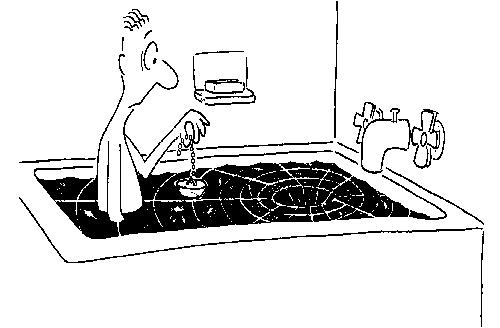
| Bad Astronomy |
|
|
|
BA Blog
|
|
Q & BA
|
|
Bulletin Board
|
| Media |
|
|
|
Bitesize Astronomy
|
|
Bad Astro Store
|
|
Mad Science
|
|
Fun Stuff
|
| Site Info |
|
|
|
Links
|
| RELATED SITES |
| - Universe Today |
| - APOD |
| - The Nine Planets |
| - Mystery Investigators |
| - Slacker Astronomy |
| - Skepticality |
Buy My Stuff

Keep Bad Astronomy close to your heart, and help make me
filthy rich. Hey, it's either this or one of those really
irritating PayPal donation buttons here.
What if the sun collapses into a black hole?
Bad Astronomy: If the Sun collapses into a black hole, the Earth and all the other planets will get sucked in.Good astronomy: If the Sun were to collapse into a black hole, we would feel no difference in the gravity as measured at the Earth.

How it works:
The gravity of an object depends on two things: the mass of the object, and the distance you are from that object. Isaac Newton showed (using calculus) that as long as you are outside a spherical object, gravitationally you can treat that object as a point mass. In other words, as you stand on the surface of the Earth, the gravity of the Earth pulls you as if all the mass of the Earth were concentrated at a point in its center. As long as you are outside the surface of the Earth this will be true. If you keep the Earth's mass the same and shrink it to the size of a golf ball, you will feel the same gravity as long as you stay more than the Earth's old radius away (about 6400 km).
The same applies if the Sun were to collapse into a black hole. Its mass is still the same, and the distance to the Sun would not change. Therefore, the gravity of the Sun felt at the Earth would remain the same. The gravity, in fact, would feel the same to you as you approach the erstwhile Sun all the way to where its surface used to be (about 700000 km from the center).
The situation changes when you get closer than where the surface used to be. Imagine you dig a hole in the Earth 100 km deep. Using some calculus, it can be shown that the mass of the Earth outside your radius (that is, the radius of the Earth minus 100 km) no longer has any net force on you. You will feel lighter. This will continue as you dig deeper, until you are at the center of the Earth. Then all the mass is outside of you, and has no net force on you. You'll be weightless! (Actually, the situation is a bit more complicated: the Earth's crust is somewhat less dense than the parts beneath it, so as you dig down, at first you actually will get heavier as you approach the more dense regions, but as you go down deeper you will start to get lighter).
So it is with the black hole Sun. As you approach, the gravity will feel just like the old Sun's, until you get closer than about 700000 km. Before, you would start to get lighter as you pierced the surface, but now the surface is still below you! The gravity gets stronger. And stronger, and stronger, and STRONGER, until you are just above the surface. At this point the gravity is so strong the tides from the black hole will rip you apart. Heavy, dude.
One more note: the Sun, by itself, cannot turn into a black hole. The above is an imaginary exercise. Stars that turn into black holes are typically either much more massive than the Sun (at least 8 times as much) or must be part of a binary system, which the Sun is not. We don't need to worry about this happening to us, but it does make a fun thought experiment!
Special thanks to Bad Reader Howard Cole for pointing out a conceptual error I had in this essay!
|
|
|
|